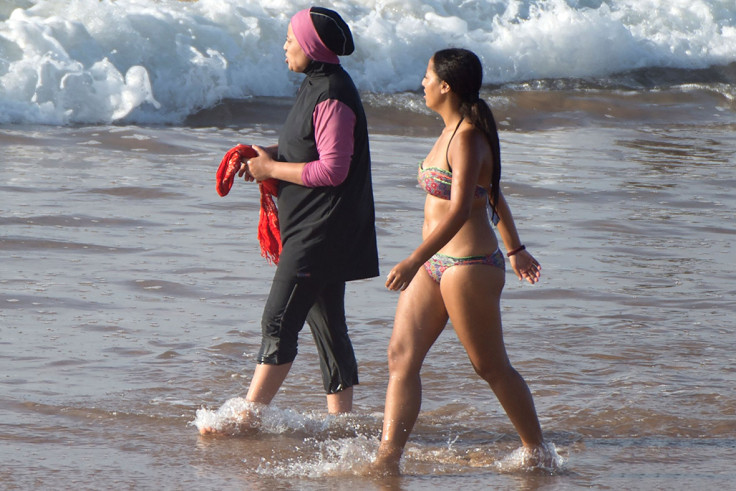Why must a Muslim woman undress to become empowered?
Islamophobia is not a Muslim problem – it is about others and their fears.
France needs a hug. And, a shrink.
Following the BurkiniGate, where 26 towns in Southern France had banned the wearing of modest swimwear 'burkini', the hysteria seems far from over. With Nicolas Sarkozy indistinguishable from Marine Le Pen's hateful and divisive rhetoric, there are more Islamophobic controversies waiting to happen as the French presidential election approaches.
The post-BurkiniGate France will look more hateful and less secular. This is already evident in the rejection of a restaurateur to serve Muslim women and calling them 'terrorists'. His justification in doing so was in response to a friend who died at the Bataclan attack. If this is a French version of tit-for-tat as per their Laïcité manifesto, then the world doesn't need its brand of secularism. If we all took to revenge attacks for the atrocities committed in the name of a country, religion or ideology, it will rob of us of any humanity.
In the past two weeks, both sides for and against the ban have written on many angles; from feminism, patriarchal stronghold on women, France's blindness towards the economic and social disenfranchisement of its Muslims, and of course, the 'backward ideology' that is Islam. Aside from votebank politics, what lies at the root of this secular schizophrenia is a serious case of denial—the Islamophobic and the colonialist kind.

Colonial legacy and its impact on Arab-Muslim identity in the French psyche is heavily underestimated. This twisted notion that freedom is about removal, about unveiling our layers is embedded in this orientalist thought. Even today, there are TV programmes that regurgitate the obsolete oriental imagery: a fantasy land far, far away with riches and domes on every house; a sand land with poor people and an oppressive king, where women are stunningly beautiful and the only way to liberate them is to take them out of their homes and into the arms of a foreign love.
In contemporary Muslim discourse, The Kebab shop and Ghetto Muslim imagery in France is so skewed and seeped in the colonial saviours complex that graduating from it is a Sisyphean task. To imagine an empowered Muslim is a struggle for many. If the ones we define as The Other becomes empowered and mainstream, how do the privileged liberals define themselves? This line of thought resonates in the response to the BurkiniGate by people who support the ban. A new scapegoat to make ourselves feel better will be needed if our lowest benchmark for society disappears.
French and Muslim cultures are very different but not incompatible. France's education and understanding of its own vision of Laicite or secularism is incomplete. It limits the embracing of plurality of its own people in today's times where nation-states do not define patriotism or identity. The focus on freedom as a central French marker of identity is problematic because freedom of speech is a double-edged sword. Where the right to offend can be a radical, contentious and praiseworthy side of the debate, the same isn't guaranteed to a woman's place in a society when her choices are not respected and valued.
In a recent conversation, I was told that Islamophobia is not real; that it is a media creation where "minor, isolated incidents are blown out of proportion", and extrapolated to appear more widespread. There is sheer arrogance in this denial of someone else's challenges and difficulties. It is not very different from the disgust we feel at the Holocaust and Armenian genocide deniers.
The only comeback from the Burkini ban supporters has been a comparison with Saudi Arabia, that this is a simple case of when-in-Rome. If there was a wild example of comparing apples and oranges, then this is it. Saudi Arabia and France were never in the same strategic league of liberal values and to juxtapose the French supposedly-liberal values and a 'we are better than them' attitude is a pathetic self-congratulatory attempt. The world has been crying out for reforms in Saudi Arabia and here we have France, justifying its delusion by comparing itself to Saudi's absent social reforms.
BurkiniGate is a slap in the face of Islamophobia deniers. It is a mirror reflecting the state of our times and the wider polarised debate because it spills onto other universal themes such as gender and the patriarchal obsession on women's existence. It is time to accept that Islamophobia is not a Muslim problem. This has always been about others; their reactions, fears and perceptions. Today it is the burkini, tomorrow there will be a war on everything remotely relating to Islam. France's secularist aspirations will remain deformed if it doesn't cap its own intolerance towards pluralistic identities.
Masarat Daud is a girls' education campaigner, TED speaker, TEDx curator, and a recent SOAS MA graduate currently based in London
© Copyright IBTimes 2025. All rights reserved.




















